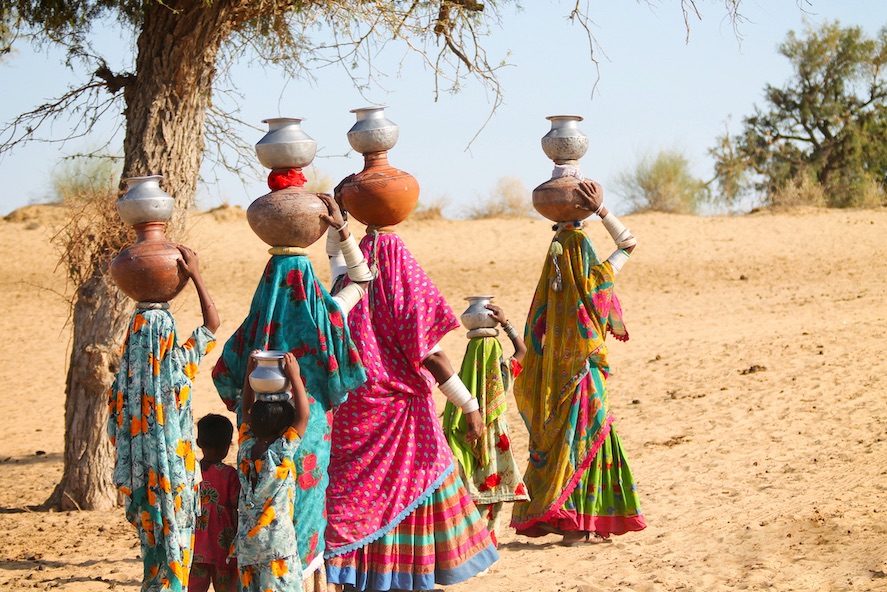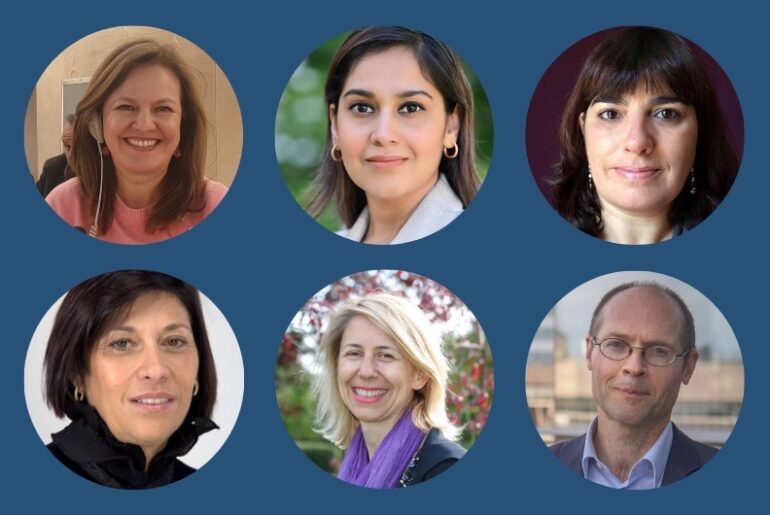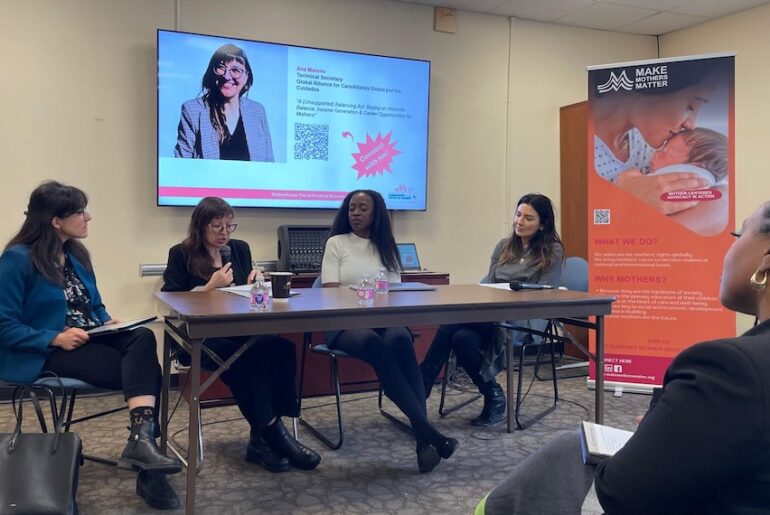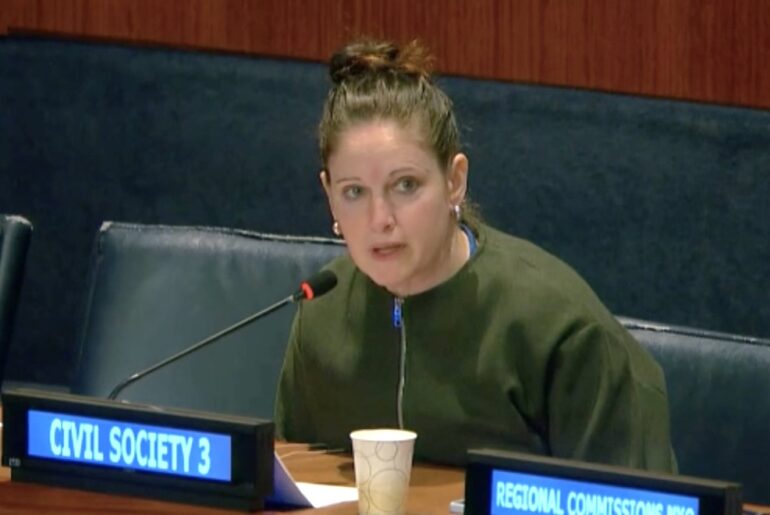Prioritising SDG 5 Target 5.4 to recognize the work of mothers and advance all the SDGs
09.05.22
UN New York, HLPF - In the Sustainable Development Goals, Target 5.4 calls for the recognition, reduction and redistribution of unpaid family care work, i.e. the domestic and care work done on a daily basis in the homes, mostly by mothers. It is a somewhat neglected target, and therefore the focus of our 2022 written statement to the 193 Member States that will meet in July to assess the implementation of the SDGs.
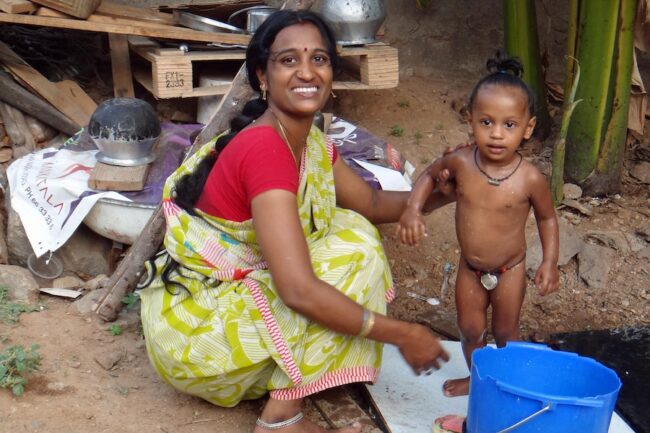
The following is the full text of our declaration – a version with sources and references can be downloaded below.
In this written Statement, Make Mothers Matter focuses on target 5.4 of the Sustainable Development Goal on gender equality (SDG 5), which will be among the goals for review this year:
![]() ‘Recognize and value unpaid care and domestic work through the provision of public services, infrastructure and social protection policies and the promotion of shared responsibility within the household and the family as nationally appropriate’.
‘Recognize and value unpaid care and domestic work through the provision of public services, infrastructure and social protection policies and the promotion of shared responsibility within the household and the family as nationally appropriate’.
We call for greater attention to this particular target, which is not only vital for progressing on gender equality, but also intersects with many other SDGs, making it key for the realisation of the whole 2030 development agenda. Care and this particular indicator must be at the centre of the necessary systemic changes to ‘build back better’ – or rather ‘build forward transformatively’.
The Covid-19 crisis has shown us what really matters. It has in particular spotlighted the critical role and importance of Care work, whether paid or unpaid.
This crisis gave visibility and a start to recognizing this essential yet undervalued and mostly invisible work – and the people behind it: care workers, most of whom being women, and mothers, who were juggling increased unpaid family care work, home schooling and paid work.
Target 5.4 – a neglected target?
 With Target 5.4, the recognition of unpaid care work is already part of the 2030 sustainable development Agenda adopted in 2015.
With Target 5.4, the recognition of unpaid care work is already part of the 2030 sustainable development Agenda adopted in 2015.
This was an important step as this target recognizes that the inequitable distribution of unpaid care work (the gender care gap) is a cause of economic injustice and hardship for women, and a major obstacle to gender equality. In particular, unpaid care work remains a barrier for many women to access the labour force, make a career and earn a decent wage.
Mothers in particular have been pushed to join the ‘productive’ labour force, but remain responsible for the bulk of care activities: more than three-quarters of all unpaid family care work is done by women, and when both paid work and unpaid work are combined, women work more than men. Economically, they are heavily penalized for it, especially when they have children – and suffer specific discrimination in relation to maternity – the ‘motherhood penalty’.
Target 5.4 also recognizes the critical importance of public services, infrastructure and social protection policies to address the issue – in particular to reduce the time that women spend on unpaid domestic and care work to compensate for the lack of essential services and infrastructure like water and sanitation, electricity, energy, telecommunication, transportation, health, etc.
Still, this particular target has not yet received the attention and traction it deserves.
Target 5.4 is associated with a single indicator, 5.4.1 – Proportion of time spent on unpaid domestic and care work, by sex, age and location, which is also among the Global Minimum Set of Gender Indicators. The problem is that this data can only be obtained by carrying out Time-Use Surveys (TUS), which are complex and expensive.
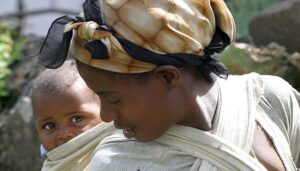 According to a 2018 ILO Report, only 72 countries have conducted such surveys at least once, with only 27 of those countries having done so at least twice. Very few countries carry out TUS on a regular basis, which would be necessary to monitor progress in reduction and redistribution of unpaid domestic and care work: the United States is the only country which has done so on a yearly basis since 2003; Switzerland has conducted TUS every three or four years since 1997, and Norway every ten years since 1970.
According to a 2018 ILO Report, only 72 countries have conducted such surveys at least once, with only 27 of those countries having done so at least twice. Very few countries carry out TUS on a regular basis, which would be necessary to monitor progress in reduction and redistribution of unpaid domestic and care work: the United States is the only country which has done so on a yearly basis since 2003; Switzerland has conducted TUS every three or four years since 1997, and Norway every ten years since 1970.
As a result, target 5.4 is usually left out of the Progress towards Sustainable Development Goals reports and their statistical annexes, and it remains largely out of the limelight.
The grim reality also is that there is none or very little progress in the reduction of the time women spend on unpaid domestic and care work and its redistribution between men and women: according to the ILO, women’s share of unpaid care work only decreased by 0.2 % over 15 years (between 1997 and 2012).
Recognizing and addressing the limitations of Target 5.4 and its single indicator
It is also important to recognize and address the weaknesses and limitations of this target as it is formulated:
- It fails to recognise that unpaid care work IS work, valuable work, which is essential to educate the next generation of citizens and workers, and which sustains our economy
- It fails to capture the huge contributions of unpaid work to our economies – e.g. in a country like Switzerland, unpaid work accounts for more than half of the total hours worked in the country
- It fails to frame spending on social protection and public services and infrastructure that support the unpaid work of caring as investments, that will have high returns in the long term – Austerity is not an option
- It fails to explicitly recognize the importance of sharing this work more equitably between men and women within the household /family
- It fails to recognize cognitive and emotional work – and the resulting mental load – which usually goes with care work and can affect mental health
- It fails to envision unpaid care work also positively as a learning experience which provides parents and other caregivers with valuable soft skills contributing to social inclusion, personal development, empowerment, and employability
- It fails to recognise the links between the gender care gap, the lack of adequate infrastructures and affordable quality care services and the poverty affecting many women, mothers in particular
- It fails to make it clear that unpaid care work should be a collective responsibility – i.e. other stakeholders beyond the households/family should also take their share of responsibility to support this work, beginning with governments at every levels but also employers in both the public and private sectors
The case for Time-Use Surveys – to be used across most SDGs
In spite of the weaknesses of target 5.4 and its indicator, the relevance and value of the underlying time-use data must be stressed: it goes well beyond gender equality and SDG 5 – in particular because of the links that the issue of unpaid care work has with other SDGs.
 As documented in a background report of the 2020 UN Statistical Commission, time-use data can inform and guide policies in a wide range of sectors, covering many if not all the SDGs:
As documented in a background report of the 2020 UN Statistical Commission, time-use data can inform and guide policies in a wide range of sectors, covering many if not all the SDGs:
- To analyze the links between monetary poverty and time poverty, how time poverty is distributed, and how in a vicious circle economic poverty reinforces time poverty (SDG 1)
- To identify and support health care services provided for free by households, usually by women; and to understand engagement in activities that can affect health, such as eating, drinking, sleeping and sports (SDG 3)
- To address the issue of girls dropping out from school because they are needed for domestic work (SDG 4)
- To show and support parents’ involvement in the formal education of their children, e.g. through overseeing homework, participating in school activities, etc. (SDG 4)
- To plan for the provision of quality early childhood care and education services, which not only prepare children for primary education (SDG 4) – but also free up time for mothers and other caregivers to do paid work, participate in public life and engage in politics (SDG 5 and 8)
- To understand the connections between paid and unpaid work and support better work-life balance, in particular for parents, which would in turn increase women’s labour force participation or income generating activities (SDG 8)
- To develop public infrastructure and services such as clean water and sanitation, electricity and energy, telecommunications or transport in order to reduce the unpaid work and time needed to palliate the absence of these infrastructure and services, which disproportionately affects women (SDG 6, 7, 9 and 11)
- To understand and address the disproportionate impact of Climate Change on women – in particular the increase of unpaid work (SDG 13)
To further progress on the 2030 development agenda, it is therefore crucial to understand the connections between Target 5.4 and other SDGs, and that this target, its indicator and the statistical tool behind it, be given more visibility and importance.
Building on the momentum of the Covid-19 crisis to transition to wellbeing economies
As stated earlier, the Covid-19 crisis has put the spotlight on Care and how central it is to our lives and our wellbeing, an important step towards recognition.
The notion of Care can also be extended to the environment: the Human Rights Council has recently recognized the human right to a clean healthy and sustainable environment, which is also important for our wellbeing. Our environment, our ‘commons’, need to be cared for.
The crisis now provides a unique opportunity for systemic change, for ‘building forward transformatively’: it is time to move away from a narrow and short-term focus on GDP growth and profit making, and to repurpose our economy to a caring economy, one that is human-centred and serves the wellbeing of both people and our planet – one that recognizes, values and supports the unpaid work of caring – one that supports the realisation of the 2030 agenda.
A 2021 joint report of the European Environmental Bureau and Oxfam Germany makes it clear: “The economy is far more than what can be bought and sold in shops: […] it is also about the vital care work done within households, about the joint management of common resources such as lakes and forests, about having access to well-run schools and hospitals provided by the state or by communities. It is about having a roof over your head, having enough healthy food to eat, being safe and being looked after when you need help. Care and community are all a part of this.”
A number of countries and cities are showing us the way. The governments of Finland, Iceland, New Zealand, Scotland and Wales are committed to moving to “wellbeing economies”. Cities like Amsterdam, Berlin, Brussels, and Sydney have adopted the doughnut economic model, which provides a useful framework to build a solid social foundation, while ensuring that economic activities are sustainable and stay within environmental boundaries.
In the current context of the multiple crises we face, it is absolutely urgent and essential that at every level, we endeavour to change the shape of our economy, which has been exploitative and destructive. Whether we call it a wellbeing economy, a caring economy or a ‘doughnut economy’, it is high time that we prioritize care and wellbeing, the essential needs of people and our planet – and it begins by prioritizing and revisiting Target 5.4.
Download the full statement with source references
This written declaration was submitted ahead of the 2022 High Level Political Forum (HLPF) that will take place from 5 to 15 July. The HLPF is the main UN platform on sustainable development and it has a central role in the follow-up and review of the implementation of the Sustainable Development Goals (SDGs) at the global level.
In 2022 its main theme will be ‘Building back better from the COVID-19 crisis while advancing the full implementation of the 2030 Agenda for Sustainable Development’; The SDGs under review this year include SDG4 (Education), SDG 5 (Gender Equality), SDG14 (Life below water), SDG15 (Life on land) and SDG17 (partnerships).
Mothers, unpaid care work and global crises – connecting the dots
02.07.24
UN New York / HLPF - Register now to join us online at this year’s High Level Political Forum side-event.
Time Poverty and the Motherhood Penalty
Unveiling Economic and Social Injustices
09.07.24
Mothers play an essential role in families by ensuring their loved ones are nourished, educated, and healthy, but their unpaid care work often leads to economic and social injustices, known
Envisioning care as a common thread to global crises
29.07.24
UN New York - Our virtual HLPF side-event brought together experts to shed light on how the various global crises we face (in particular climate change and other environmental crises,
